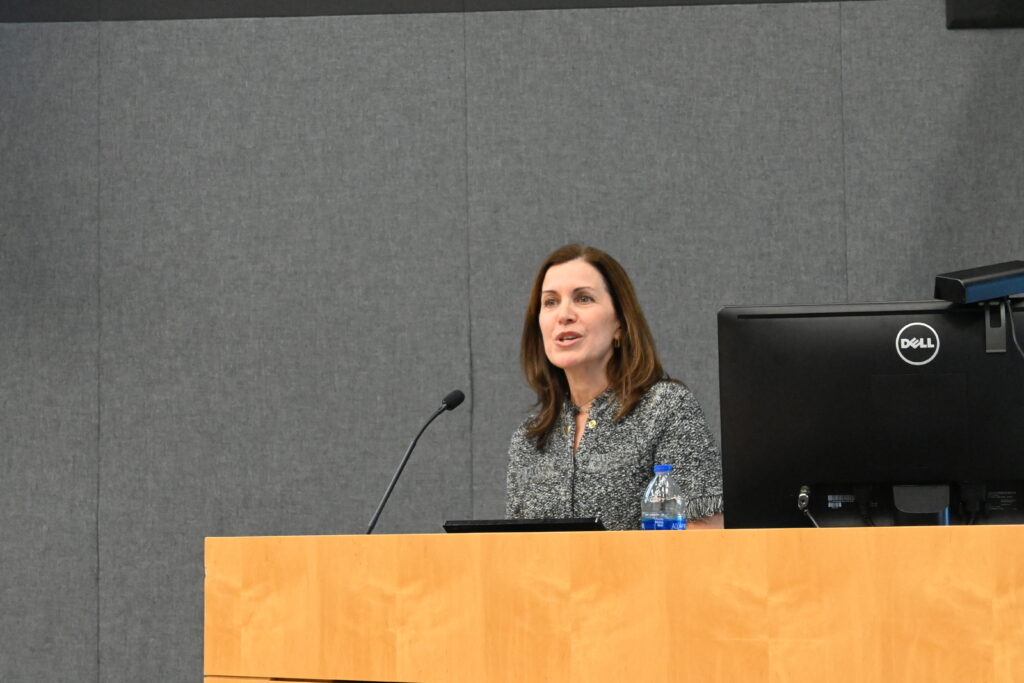Tales of burnout and success: Lisa Greene shares executive history and reflections on the corporate world
4 min read
Greene shares her personal history with burnout and reflects on her experiences. | Lauryn Taylor, The Weekly Ringer
by Enya Cea-Lavin
Staff Writer
“The weight of that was just something I couldn’t bear any longer,” said Lisa Greene, a UMW alumna who returned to her alma mater to speak about burnout. “But it just got to the point where I met with my boss that summer and said, ‘I’m leaving and this time there is no way you’re talking me into it again.’”
This is how Greene felt as she sought to alleviate the increased pressures of her job due to various factors, including the pandemic and the presidential election.
Greene spoke on Feb. 1 in the HCC Digital Auditorium about a topic on many students’ minds: burnout. She reflected on her own experiences as a former CNN and Warner Media executive, sharing her personal history with burnout and hoping to inspire others through her history of decision-making.
For Greene, “burnout” is “a state of physical or emotional exhaustion that also involves a sense of reduced accomplishments and loss of personal identity.”
At this time in her life, Greene was at the top of her profession, and CNN was at the height of its success. Over 10 years, Greene expanded her role from Director of Human Resources at CNN in Washington, D.C. to Senior Vice President of Human Resources at CNN Worldwide. In March 2019, she became the Chief Human Resource Officer of news and sports at Warner Media, the parent company of the popular news network. In this new role, she also served as a strategic advisor and became a member of the executive leadership team.
Due to her history of high-level positions, Greene described how her roles caused her to accumulate stress and affected her ability to rest, which caused her to burn out.
However, Greene was more worried about her team and responsibilities than her well-being, and the side effects of her lifestyle manifested in a variety of ways. She noted that she struggled with clarity, and it took her two to three years to realize the issues of her current state.
“It was the relentless workload,” she said. “I never felt like I was on top of that to-do list in a way that really made me feel successful.”
But burnout was only one step in Greene’s career, and she explained the baby steps she took to become an executive coach and open her own consulting firm in 2022. To begin, she started saving money, since she felt like finances would be her biggest setback. Then, she told her friends and family about her burnout and emotional distress and resigned from the same job three times after she was convinced to stay after her first two attempts.
In relation to her feelings of anxiety, Greene talked about the idea of “shoulding.” She coined the term to describe how the word, “should” was used to disregard her current state at the time.
“It was always ‘I should be happy. I should be grateful. I should go to the thing. I should answer more emails,’ right?” she said.
The last concept that Greene brought up was awareness, as she was not aware of what was going on with herself when first experiencing burnout.
“My body was sending me all kinds of messages,” she said. “So those various illnesses that I had, the ailments that I could never resolve … those are all messages.”
Greene also discussed gender politics in the workplace following a question about female camaraderie in a male-dominated executive suite. She noted that she considered her gender as she rose through the ranks and approached burnout.
“I was like, ‘I am not going to let this job get the best of me because I don’t know what that says about women,’” said Greene. “I don’t know that that was my primary thought, but I do think it was secondary—sort of letting the sisterhood down by saying ‘I can’t do this anymore.’ Because that’s ultimately what my resignation was about.”
Students who attended the talk learned about burnout, but they were also able to learn about possible future careers from her speech.
Rob Oehler, a senior psychology major and event attendee, appreciated hearing Greene’s perspective, especially because she strayed from the usual career path that many psychology students take.
“It’s nice to see career professionals with a background in psychology,” he said. “You feel like you have to be a psychologist or a clinician—that or research—so it’s nice to be exposed to other options and get a frank perspective on corporate America.”











